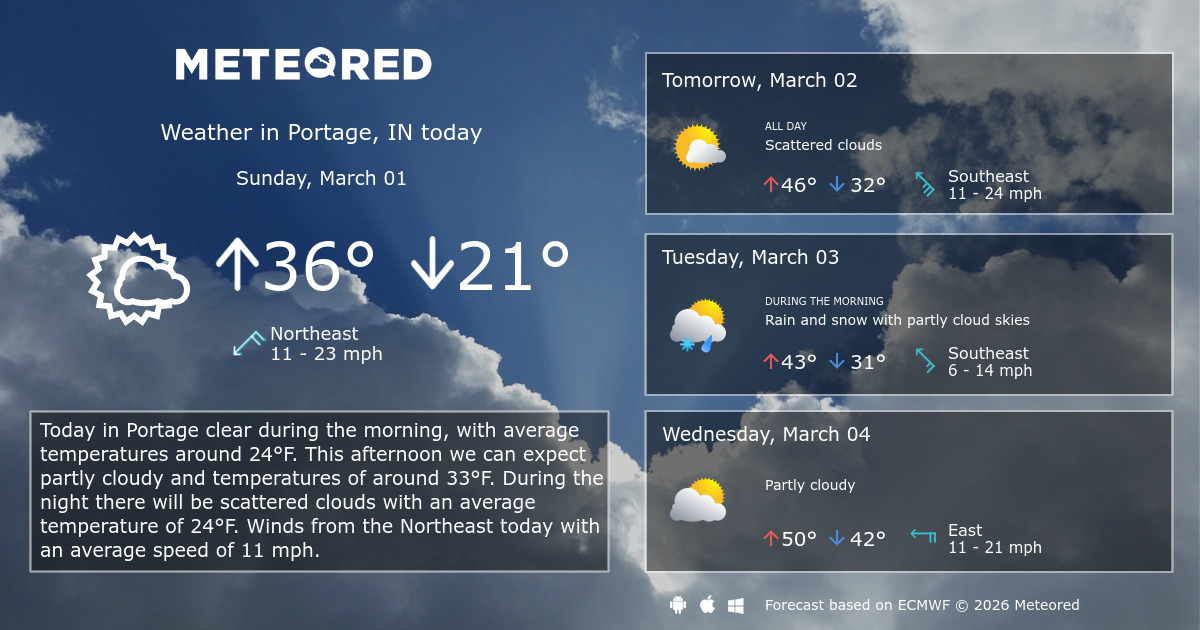Portage Weather Forecast

Portage weather – Portage, located in the scenic Midwest, experiences a diverse range of weather patterns throughout the year. From the frigid winters to the balmy summers, Portage’s weather is influenced by its proximity to Lake Michigan and the prevailing westerly winds.
The Portage weather is often unpredictable, with sudden changes in conditions. It’s important to stay informed about weather warnings, especially during severe weather events like tornadoes. Recently, a broward county tornado warning was issued, urging residents to seek shelter immediately.
While Portage may not be directly affected by this warning, it’s a reminder to always be prepared for any weather conditions.
The city enjoys a temperate climate with four distinct seasons. Winters in Portage are characterized by cold temperatures, occasional snowfall, and icy conditions. The average temperature in January, the coldest month, hovers around 20°F (-7°C). However, extreme cold snaps can occasionally dip temperatures below zero.
Portage weather is a fickle mistress, with a penchant for sudden shifts and unpredictable moods. But even in its most tempestuous moments, there’s a certain charm to it, a raw beauty that can’t be denied. Just like the vibrant tapestry of Kalamazoo County , with its rolling hills and sparkling lakes, Portage weather adds a unique flavor to the region, making it a place where the unexpected is always just around the corner.
Precipitation
Portage receives an average of 35 inches of precipitation annually, which is evenly distributed throughout the year. Snowfall is common during the winter months, with an average of 40 inches per season. The city experiences occasional thunderstorms during the spring and summer, bringing heavy rainfall and the potential for flooding.
Portage weather is typically mild and pleasant, with average temperatures ranging from the mid-60s to the mid-80s. However, severe weather can occur, as evidenced by the recent martin county tornado warning. Fortunately, the tornado did not cause any major damage or injuries, but it serves as a reminder that even in areas with mild weather, it’s important to be prepared for severe weather events.
Portage weather can be unpredictable, so it’s always best to stay informed about the latest weather conditions.
Wind and Humidity, Portage weather
The prevailing westerly winds in Portage contribute to the city’s relatively high humidity levels. The average humidity ranges from 60% to 80% throughout the year, with the highest levels occurring during the summer months. The combination of high humidity and warm temperatures can make summer days feel uncomfortable.
The weather in Portage can be unpredictable, with sudden changes in temperature and precipitation. While tornadoes are rare in the area, it’s important to be aware of the possibility, especially during severe weather warnings. Recently, a martin county tornado warning was issued, prompting residents to take shelter.
Fortunately, the tornado did not materialize, but it serves as a reminder of the importance of staying informed and prepared during inclement weather.
Upcoming Weather Events
According to the National Weather Service, Portage is expected to experience a mix of weather conditions in the coming week. A cold front is expected to move through the area on Tuesday, bringing with it rain and possible thunderstorms. Temperatures will remain mild, with highs in the mid-50s and lows in the low 40s. By the weekend, the weather is forecast to clear, with sunny skies and temperatures in the low 60s.
Comparison to Nearby Locations
Compared to other nearby locations, Portage’s weather is generally milder. The city experiences less extreme temperatures than inland areas and has a shorter snow season than cities further north. The proximity to Lake Michigan also helps moderate temperatures, resulting in a more temperate climate overall.
Portage Weather Patterns

Portage, located in the midwestern region of the United States, experiences a humid continental climate characterized by warm, humid summers and cold, snowy winters. The city’s weather patterns are influenced by several factors, including its location in the Great Lakes region, its proximity to the Mississippi River, and its relatively flat terrain.
Seasonal Trends
Portage experiences distinct seasonal changes throughout the year. Summers are typically warm and humid, with average temperatures ranging from the mid-60s to the low 80s Fahrenheit. The warmest months are July and August, with average temperatures in the low 80s. Winters are cold and snowy, with average temperatures ranging from the mid-20s to the low 30s Fahrenheit. The coldest months are January and February, with average temperatures in the low 30s.
Factors Influencing Portage’s Weather
Several factors influence Portage’s weather patterns, including:
– Location in the Great Lakes region: The Great Lakes act as a heat sink, moderating temperatures in the region. This helps to keep summers cooler and winters warmer than they would be otherwise.
– Proximity to the Mississippi River: The Mississippi River also helps to moderate temperatures in Portage. The river’s warm waters help to keep winters milder, and its cool waters help to keep summers cooler.
– Relatively flat terrain: Portage’s relatively flat terrain allows for cold air to settle in the area during the winter months. This can lead to cold, snowy winters.
Portage Weather History
Portage, located in the Midwest region of the United States, has experienced a diverse range of weather conditions throughout its history. From extreme heat and drought to frigid winters and severe storms, the city’s weather has shaped its landscape and influenced the lives of its residents.
Long-term records indicate that Portage’s climate has undergone gradual changes over the past century. The average annual temperature has risen by approximately 2 degrees Fahrenheit, and the frequency of extreme heat events has increased. Additionally, the city has experienced a decrease in precipitation, particularly during the summer months.
Climate Change Impact
The observed changes in Portage’s weather patterns are consistent with the global trend of climate change. As greenhouse gas emissions continue to rise, the Earth’s atmosphere traps more heat, leading to an overall increase in temperatures. This warming trend is expected to continue in the future, resulting in more frequent and intense extreme weather events.
The unpredictable portage weather can turn sunny skies into a torrential downpour in an instant. This erratic pattern is reminiscent of the recent e coli lake anna scare, where the presence of bacteria fluctuated rapidly, causing concern among swimmers. Just as the lake’s clarity can change overnight, so can the weather in portage, making it essential to be prepared for both sunshine and showers.